Key Tenant Screening Laws in California for 2024

Tenant Screening Laws California 2024
Understanding Tenant Screening Laws in California for 2024
Tenant screening is a critical step in the rental process. It involves evaluating potential tenants to ensure they meet a landlord’s criteria for financial stability, rental history, and other factors. As California implements stricter tenant screening laws in 2024, landlords and property managers must stay informed to ensure compliance and avoid legal pitfalls.
What is Tenant Screening?
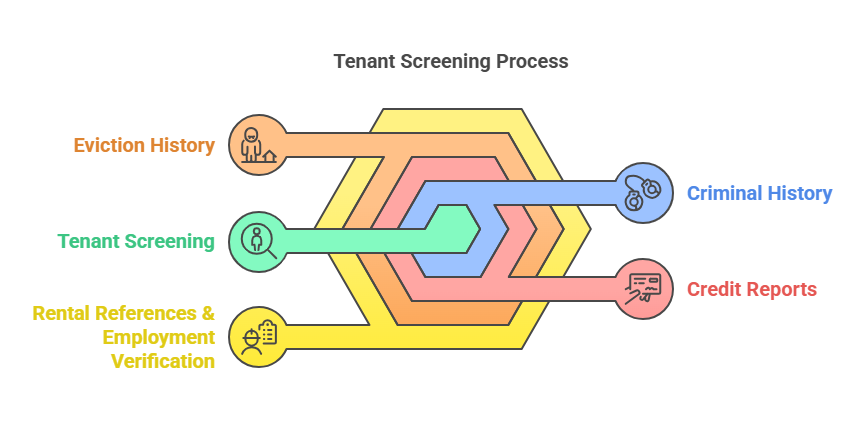
Tenant screening refers to the process of evaluating potential tenants by reviewing their background information. It helps landlords make informed decisions and minimize risks associated with renting properties. Typical screening factors include:
- Criminal history
- Credit reports
- Eviction history
- Rental references
- Employment verification
Why Tenant Screening is Important
Tenant screening protects landlords and creates a positive rental experience by:
- Reducing risks of nonpayment or property damage.
- Ensuring tenant safety and compatibility within the rental community.
- Identifying potential legal or financial risks.
Failing to conduct proper tenant screenings can lead to financial losses, disputes, and legal issues.
Overview of Tenant Screening Laws in California
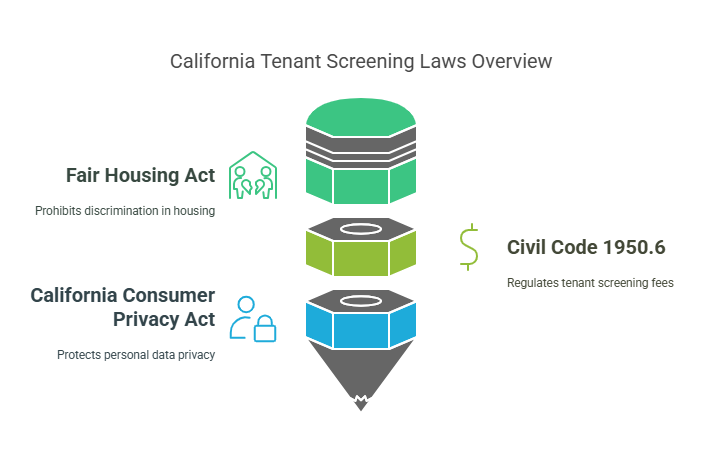
California has some of the nation’s most comprehensive tenant screening laws. These laws aim to protect tenants from discrimination, unfair practices, and privacy violations while ensuring landlords have access to essential information.
Key laws include:
- Fair Housing Act (FHA): Prohibits discrimination based on race, color, religion, sex, familial status, disability, or national origin.
- California Civil Code 1950.6: Regulates tenant screening fees and outlines what landlords can legally charge for background checks.
- California Consumer Privacy Act (CCPA): Ensures the protection of tenants’ personal data during the screening process.
What is Covered by Tenant Screening?
In California, tenant screening often involves reviewing the following:
| Category | Details |
|---|---|
| Criminal History | May include convictions but not arrests that didn’t result in convictions. |
| Credit Reports | Offers insights into financial stability and payment history. |
| Eviction History | Provides records of prior evictions. |
| Rental History | Verifies past rental experiences and references from former landlords. |
| Employment Status | Confirms income and job stability. |
Legal Restrictions on Tenant Screening
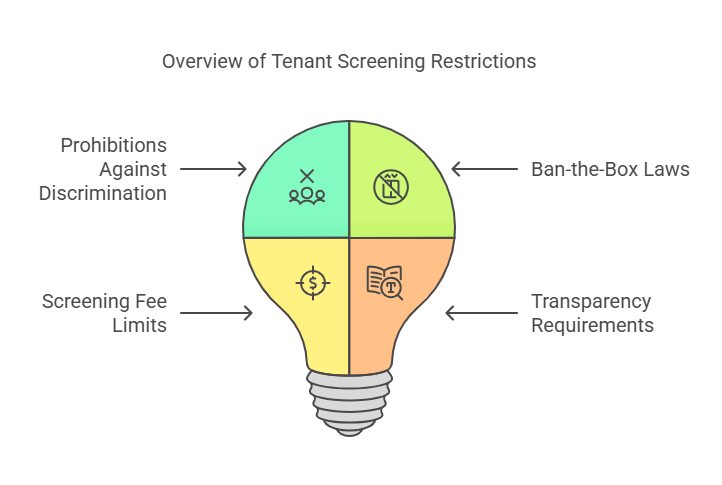
California imposes several legal restrictions to ensure fairness and transparency, including:
- Prohibitions Against Discrimination: Landlords cannot deny applicants based on protected characteristics under the Fair Housing Act and California’s Fair Employment and Housing Act (FEHA).
- Ban-the-Box Laws: Landlords cannot automatically reject tenants based on criminal records, especially for arrests without convictions.
- Screening Fee Limits: The maximum tenant screening fee must align with California law, adjusted annually for inflation.
- Transparency Requirements: Landlords must disclose their screening criteria and notify tenants if their application is denied based on background check results.
Changes in Tenant Screening Laws for 2024 and Best Practices
Tenant screening is a critical process for landlords and property managers, but staying compliant with California’s evolving regulations can be challenging. In 2024, several new tenant screening laws have been introduced to further protect tenant rights, limit discrimination, and ensure transparency in rental practices. This section provides an in-depth look at the changes, detailed steps for compliance, and best practices for landlords to navigate these laws effectively.
Key Updates in Tenant Screening Laws for 2024
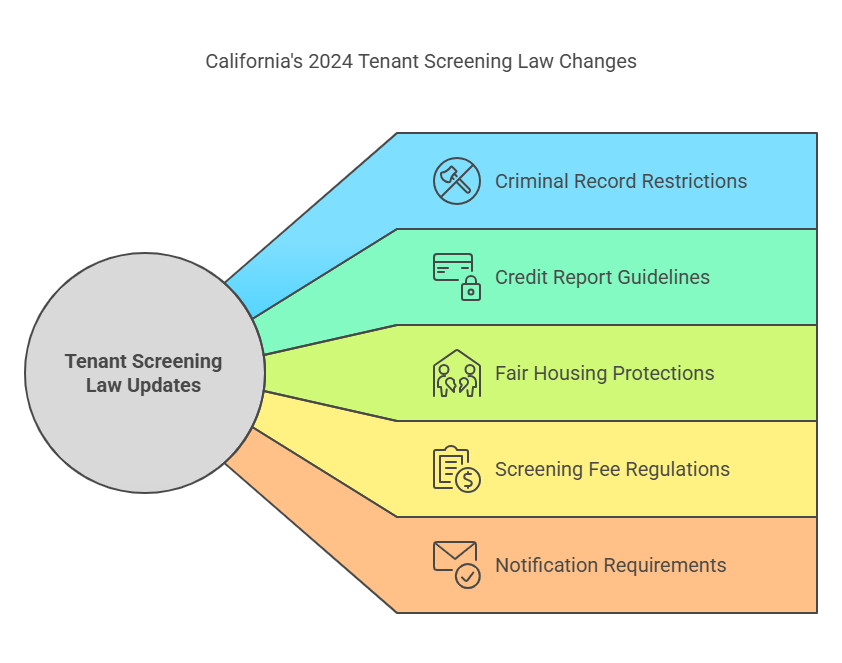
1. Ban on Using Certain Criminal Records
California has expanded its “ban-the-box” regulations, further restricting how landlords can use criminal history in tenant screening. Under the 2024 updates:
- Arrest Records: Landlords are prohibited from denying applications based on arrests that did not lead to convictions.
- Sealed or Expunged Records: Information about expunged or sealed criminal records cannot be used as grounds for rejection.
- Misdemeanor Convictions: Non-violent misdemeanors older than seven years may not be considered in screening decisions.
- Individualized Assessments: Landlords must conduct case-by-case evaluations of criminal history, considering factors like the nature of the offense, time elapsed, and its relevance to tenancy.
These measures aim to prevent unfair bias against tenants with past legal issues while ensuring landlords can still make informed decisions.
2. Stricter Rules on Credit Report Usage
Credit reports remain a key component of tenant screening, but California has imposed stricter guidelines for their use in 2024:
- Disclosure Requirements: Landlords must explicitly inform tenants how credit information will influence their decision.
- Adverse Action Notifications: If an applicant is denied based on credit data, landlords must provide a written explanation, including the reason for rejection and contact information for the credit reporting agency.
- Emphasis on Context: Landlords are encouraged to consider mitigating factors, such as recent improvements in credit scores or a tenant’s willingness to provide additional financial documentation.
3. Expanded Fair Housing Protections
California’s Fair Housing laws have been broadened to include new protected classes. Discrimination is now explicitly prohibited based on:
- Source of Income: Landlords must accept legal income sources, including government assistance programs like Section 8 vouchers.
- Immigration Status: Applicants cannot be denied housing based on their immigration status or national origin.
- Domestic Violence Survivors: Protections for survivors of domestic violence have been strengthened, preventing discrimination against tenants with protective orders or related history.
Landlords must apply consistent screening criteria to all applicants and document their processes to demonstrate compliance.
4. Tenant Screening Fee Adjustments
California Civil Code 1950.6 has been updated to regulate tenant screening fees more closely:
- Fee Cap: Tenant screening fees are now capped at $60 per application, adjusted annually for inflation.
- Receipts: Upon request, landlords must provide tenants with an itemized receipt detailing the costs associated with the background check.
- Fee Transparency: Landlords are required to disclose upfront whether the screening fee is refundable if the tenant withdraws their application.
5. Enhanced Notification and Disclosure Requirements
Landlords must now provide clear disclosures during the screening process, including:
- Screening Criteria: A written explanation of the criteria used to evaluate tenant applications.
- Third-Party Screening Services: The name and contact details of any third-party screening service involved.
- Adverse Action Notices: Detailed explanations for denials, including information on how tenants can dispute inaccuracies in their records.
How to Conduct Tenant Screening in Compliance with 2024 Laws
Complying with California’s tenant screening laws in 2024 requires landlords to adapt their practices to meet updated requirements. Here is a step-by-step guide:
Step 1: Obtain Tenant Consent
Before initiating any screening process, landlords must:
- Provide tenants with a written notice outlining the types of information to be collected (e.g., credit report, criminal background, rental history).
- Secure written consent from the tenant. This is not only a legal requirement but also a critical step in ensuring transparency.
Step 2: Use Reputable Screening Services
Choosing a compliant tenant screening service is essential. Reliable providers, like Exact Background Checks, help landlords adhere to the latest regulations by:
- Excluding Restricted Information: Reports omit prohibited data, such as arrest records without convictions.
- Privacy Protections: Ensuring that sensitive tenant information is handled securely.
- Compliance Tools: Offering built-in tools for adverse action notifications and Fair Housing compliance.
Step 3: Evaluate Applicants Fairly and Consistently
When assessing tenant applications:
- Apply Uniform Standards: Use the same screening criteria for all applicants to avoid claims of discrimination.
- Conduct Individualized Assessments: Evaluate criminal history and other factors on a case-by-case basis, considering mitigating circumstances.
- Document Decisions: Keep detailed records of screening criteria and decisions to demonstrate compliance with Fair Housing laws.
Step 4: Provide Adverse Action Notices
If a tenant is denied based on their background check, landlords must:
- Deliver a written notice explaining the decision.
- Include a copy of the background report and details about the tenant’s rights to dispute inaccuracies.
- Specify how the tenant can obtain a free copy of their report from the screening agency.
Best Practices for Landlords in 2024
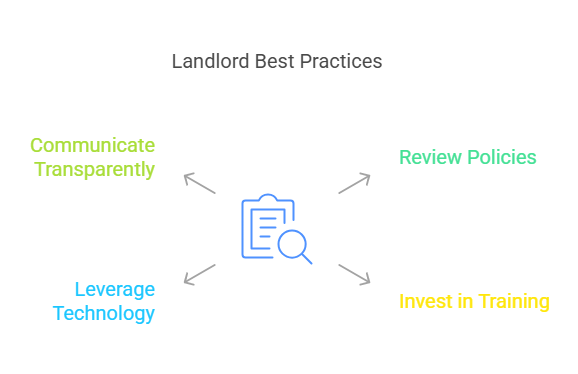
To ensure compliance and improve the tenant screening process, landlords should:
- Regularly Review Screening Policies: Update practices annually to align with new laws.
- Invest in Training: Educate property managers and staff on Fair Housing laws and the importance of consistent, non-discriminatory screening.
- Leverage Technology: Use platforms like Exact Background Checks to automate compliance checks, streamline the application process, and generate legally compliant reports.
- Communicate Transparently: Keep tenants informed about the screening process, criteria, and their rights throughout.
Common Mistakes Landlords Should Avoid
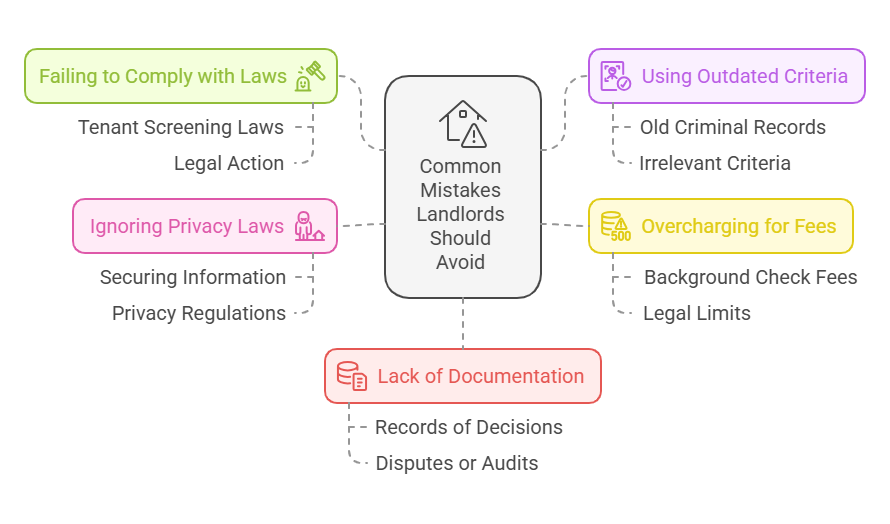
Failing to comply with tenant screening laws can result in legal action or penalties. Avoid these common mistakes:
- Using Outdated Criteria: Screening based on old or irrelevant criminal records.
- Overcharging for Fees: Charging more than the legal limit for background checks.
- Ignoring Privacy Laws: Mishandling tenant information or failing to secure it properly.
- Lack of Documentation: Not keeping records of decisions, which could lead to disputes or audits.
Timeframe for Screening Results
The time required for tenant screening varies based on the services used. While some background checks are processed within 24 hours, others, such as criminal record searches, may take up to three business days. Landlords should account for these timelines and communicate them to applicants.
How to Handle Unresponsive Past Landlords
If a past landlord is unresponsive during the rental history verification process:
- Request Alternative Documentation: Tenants can provide utility bills, rent receipts, or bank statements as proof of residency.
- Check Public Records: Use tenant screening services that access rental history through eviction databases or other public records.
- Ask for Additional References: Request professional or personal references from the tenant to supplement missing rental history information.



